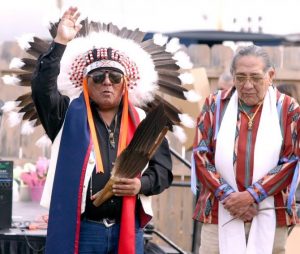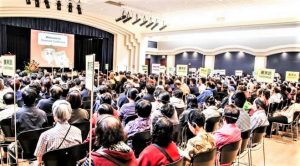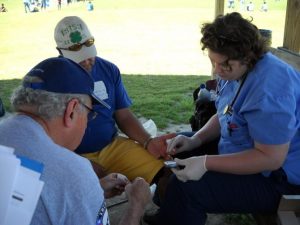National Health Center Week (#NHCW) recognizes the extraordinary contributions of community health centers, and their essential role in expanding access to high-quality, comprehensive health care and improving the very lives of those they serve.
Today, community health centers serve 27 million people, at more than 10,000 urban, rural, and frontier locations. Like the communities they serve, every health center is unique – a distinctive embodiment of its community’s needs and aspirations for better health and health care. Yet at the heart of the community health center movement is a shared mission, and a commitment to ensure the best possible care to all, regardless of their circumstances, insurance status or ability to pay. This year’s NHCW theme, Celebrating Health Centers: Home of America’s Health Care Heroes, showcases the people – staff, board members, volunteers and community leaders – who individually and collectively embody that commitment, and go above and beyond to promote the health center mission.
In this special #NHCW edition, we celebrate the work of health centers across the country through recaps of #MembershipMonday, a special feature of our CHroniCles project. We thank the National Association of Community Health Centers for their collaboration on Chronicles #MembershipMonday and their unparalleled leadership during #NHCW and every day, and applaud the work of you all – our colleagues at community health centers and primary care associations in Kansas, California, North Carolina, Georgia and across America – the dedicated heroes who ensure that the health center vision and mission is fulfilled.
________________________________________________________________________________________________________________________________________________________
Hunter Health Clinic (Wichita, KS)
Hunter Health Clinic was founded to address the overwhelming need for culturally competent health care for urban Indians. The clinic opened at The Mid-America All-Indian Center in 1976, with volunteer medical services provided by Dr. Vernon Dyer, a Prairie Band Potawatomi OB/Gyn physician. Four years later, it was funded as a Title V Urban Indian Health Organization and incorporated as the Wichita Urban Indian Health Center. By 1985, the health center had expanded to serve the broader community and was renamed Hunter Health Clinic, in honor of Jay and Vera Hunter, respected Indian elders and school teachers who believed in helping people in all walks of life.
The first federally qualified community health center in the state, Hunter Health Clinic now serves patients at 3 locations. The Center offers comprehensive, patient centered and community-oriented care, including medical, dental, behavioral health and pharmacy; it is a designated Health Care for the Homeless center and Urban Indian Health Clinic. A Traditional Health Coordinator works as an advocate for American Indian/Alaska Native patients and ensures that the services offered by Hunter Health are responsive to the local community. The health center recently opened a new 21,000-square-foot facility, providing a state-of-the art home for its unique model of integrated, holistic, person-centered care.

Ground blessing ceremony at Hunter Health Clinic (2005)
________________________________________________________________________________________________________________________________________________________
Georgia Primary Care Association
Founded in 1977, the Georgia Primary Care Association (GPCA) is a member service organization representing the state’s 34 CHCs, which together serve nearly 500,000 Georgians at 205 clinic sites covering 111 counties.
GPCA provides training and technical assistance to expand and strengthen the community health center network. Additionally, GPCA develops and implements additional programs and services to enhance the health care delivery system. One such initiative is the Patient-Centered Medical Home Learning Community (PCMH), part of the PCA’s Clinical Quality Program. The objectives of the PCMH Learning Community are to provide a platform for collaboration and sharing between health centers, offer technical assistance and in-person training sessions to implement PCMH principles, and most importantly, to promote sustainability of lessons learned long after project completion.
These activities are reflective of GPCA’s core mission, focused on improving access to comprehensive primary health care services for all medically underserved Georgians, as well as supporting the continued development and expansion of community-based health center practice systems throughout the state.
________________________________________________________________________________________________________________________________________________________
Asian Health Services (Oakland, CA)
Asian Health Services, founded in 1974, grew out of the student activism of the civil rights and social justice movements. These movements gave rise to a commitment to serve and advocate for the Asian and Pacific Islander (API) community by ensuring access to health care services regardless of income, insurance status, immigration status, language or culture. Emphasizing the importance of community organizing and engagement as an integral part of its mission, AHS has undertaken special community organizing initiatives such as the “Revive Chinatown” pedestrian safety campaign and the California Healthy Nail Salon Collaborative.
From its earliest days as a one-room clinic staffed by volunteers, AHS now serves more than 28,000 people annually, providing comprehensive medical, mental health and dental services at 10 medical and 6 dental clinics, including elementary and high school sites. AHS is a leader in the provision of culturally and linguistically competent health care, especially for those APIs who are underserved, low-income, and – like nearly 70% of the health center’s patients – best served in a language other than English. Health center staff offer care in more than a dozen languages to meet these diverse language needs – which include Arabic, ASL, Burmese, Cantonese, Karen, Karenni, Khmer, Korean, Lao, Mandarin, Mien, Mongolian, Tagalog, Vietnamese – and simultaneous translation is provided at community meetings, so that all can participate effectively.

Community meeting conducted with multilingual translation, Asian Health Services
________________________________________________________________________________________________________________________________________________________
Green County Health Care, Inc. (Snow Hill, NC)
Greene County Health Care, Inc. has been providing primary health care in eastern North Carolina for over 45 years, beginning in 1972. The center has grown from a single office in Walstonburg to a large organization serving more than 42,500 people annually, at multiple service delivery sites spread across Greene, Pitt and Pamlico counties. The health center continues to serve a high-need, low–income population; nearly all have incomes at or below the poverty level, and more than 85% are uninsured.
Today, Green County Health Care, Inc. operates 6 primary medical care sites and 3 dental care sites as well as mobile dental care, school health and services to the area’s farmworkers. The health center’s outreach teams expands its reach to ensure that the area’s rural population and migrant and seasonal agricultural workers can access care. Green County has an integrative focus, offering a range of services for the entire family, and to support the entire community, including the full range of primary, diagnostic and preventive medical services for children, teens and adults, comprehensive dental care, family therapy, education, case management and outreach.

Green County Health Care, Inc. outreach workers
________________________________________________________________________________________________________________________________________________________
Changing Care, Changing Lives: The Community Health Center Story
#NHCW18 celebrating our movement’s health care heroes, is a great time to watch Changing Care, Changing Lives: The Community Health Center Story, recorded as part of the CHroniCles project. CHroniCles – conceived in conjunction with NACHC and the Geiger Gibson program at Milken Institute School of Public Health, George Washington University, and developed and hosted by RCHN CHF – honors and preserves the living history of the CHC movement. With hundreds of collected narratives, photos and documents, Chronicles depicts the unique role of community health centers in the American healthcare system. The video – part of our series of health center stories – features health center leaders across the U.S. who reflect upon the history, mission and growth of their organizations and the community health center movement as a whole
________________________________________________________________________________________________________________________________________________________
See you at the NACHC CHI and EXPO
We will be showcasing CHroniCles at this year’s NACHC Community Health Institute (CHI) and EXPO (August 25-28) in Orlando, Florida. We would love to hear from you, learn about your organization, and add your history to the on-line chronicle of America’s thriving, growing, exceptional community health center movement. Come by and say hi to us at the CHroniCles booth in the EXPO Hall! We’ll have raffles, giveaways and treats!
Can’t make it to the CHI and EXPO? We would still love to add or update your CHroniCles profile and share your unique story. To get involved, please contact Irene Bruce, CHroniCles Coordinator, via email to ibruce@rchnfoundation.org.



